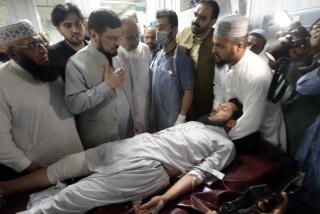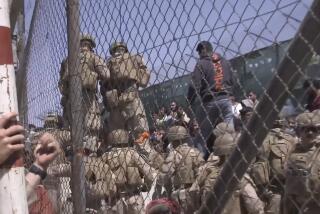Kabul bombing seen as warning to Afghan voters
- Share via
KABUL, AFGHANISTAN — The thunderous explosion Saturday that targeted Western military headquarters in the heart of Kabul carried an ominous message aimed at ordinary Afghans just five days before national elections: Vote at your peril.
The audacious suicide car bombing, which killed at least seven people and injured nearly 100, appeared designed to signal that insurgents can strike at will even in the capital’s most tightly guarded districts.
“The intent here is clear,” said Aziz Rafiee, executive director of the Afghan Civil Society Forum. “To give the impression, as we approach the vote, that measures taken for security by the Afghan government and the international community are fragile.”
President Hamid Karzai, facing a tough challenge in Thursday’s presidential and provincial assembly balloting, declared that “enemies of Afghanistan . . . are trying to create fear among the people as we get close to the election.” He predicted that people would defy the Taliban’s campaign of intimidation and go to the polls.
The Obama administration and the Western military are heavily invested in a successful vote, which they hope will enhance the legitimacy of the central government and bolster efforts to increase Afghanistan’s self-sufficiency in security matters. President Obama has called the balloting the most important event of the year in Afghanistan.
The attack, at the gates of the sprawling base that serves as the seat of North Atlantic Treaty Organization forces in Afghanistan, was a bold one. The car used in the bombing, which carried an estimated 600 pounds of explosives, would have had to pass through several rings of security to get so close to the military headquarters: checkpoints, rolls of barbed wire, red-and-white-striped safety gates and concrete barriers.
The outermost checkpoints, on busy city streets, are staffed by Afghan police officers, not international troops, suggesting that laxity or even complicity could have played a role.
The street where the bomber struck is one of the most closely secured in Kabul. The U.S. Embassy is next door, and the presidential palace is nearby. Only traffic bound for the military headquarters is supposed to enter by the route the vehicle took.
NATO’s International Security Assistance Force said in a statement that several soldiers were wounded, but did not give their nationalities or say where they were stationed at the time. The gate usually is guarded by a small contingent of Macedonian soldiers who are relatively exposed to the street.
The main part of the base lies a considerable distance from the front gate, beyond more concrete barriers, a long entry drive and a maze-like pedestrian entrance.
Army Gen. Stanley McChrystal, commander of U.S. and Western forces in Afghanistan, was in a meeting in a bunker-like basement when the attack occurred about 8:30 a.m. His spokesman, Rear Adm. Gregory Smith, said that after gathering information about what had happened, senior military officers continued their meeting.
Election security has been a chief preoccupation of Western forces in Afghanistan; this summer’s buildup of U.S. troops was largely spurred by the desire to safeguard the vote.
“Clearly, the Taliban are using every means possible to terrorize Afghans,” Smith said.
The brunt of the explosion was taken by Afghan civilians: employees at the nearby Ministry of Transportation, just beginning their workweek, and shopkeepers in a nearby row of small establishments.
From his hospital bed, engineer Amir Mohammed described chaos inside the ministry building, where the force of the blast tossed chairs and tables about and sent glass flying. “I thought the explosion must be inside our building,” he said. “For five minutes the dust was so thick I could not see.”
A small group of street boys usually congregates at the gate of the base, cajoling small change from foreigners.
A beggar named Hossain Mohammed, 14, but small for his age, said he was down the street buying bread when the bomb went off. He was uninjured, “but I cannot find my friend,” he whispered. “I’m not going to come to this place anymore.”
Many Afghans, including those who suffered a close brush with the bombing, said they would be undeterred in going to the polls.
“Yes, it’s meant to scare us, but I’ll vote anyway. We’re used to war,” said Hassibullah Askarzada, 21, who works in an office around the corner. “The election is important for our country.”
But 82-year-old Haji Din Mohammed, who was in his carpet store when the force of the blast shattered his front display window, said he did not know whether he would venture out on election day.
“I’m old and sick,” he said, as neighbors gathered up shards of glass. “It’s only through God’s blessing I survived this.”
The attack was the worst in the capital since February, when insurgents staged near-simultaneous raids on three government buildings. Those gun-and-bomb strikes left more than two dozen people dead, including passersby and eight assailants.
Violence has increased markedly around the country in recent weeks, but most of it has been concentrated in the south, the traditional Taliban heartland and the center of the lucrative drug trade. U.S. Marines and British forces have spent much of the summer fighting bloody battles in Helmand province.
Military officials have expressed hope that confronting the Taliban in Helmand will encourage Afghans to come out and vote, but the sometimes-intense fighting has prompted many people to flee their homes. Insurgents in some areas have threatened to cut off the fingers of those whose digits are stained with the indelible ink that proves a person has voted.
A Taliban spokesman made a call to the Associated Press claiming responsibility for Saturday’s attack, but initially said -- incorrectly -- that the bomber was on foot.
Suspicion also fell on the Haqqani network, an Al Qaeda-linked group believed to have carried out some of the most sophisticated and lethal attacks in and around the capital.
--
More to Read
Sign up for Essential California
The most important California stories and recommendations in your inbox every morning.
You may occasionally receive promotional content from the Los Angeles Times.













